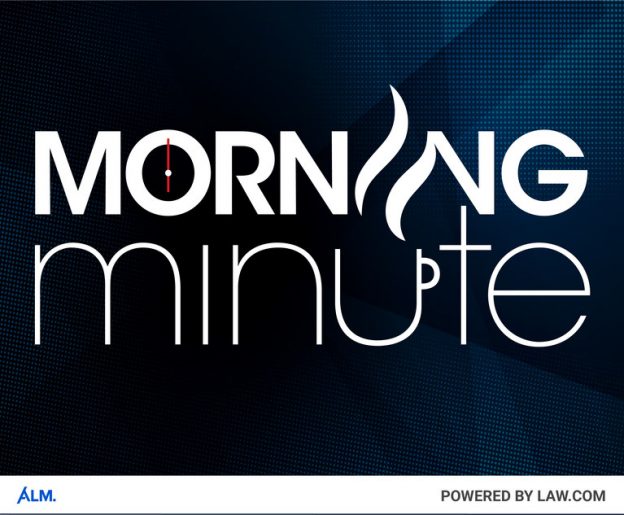Survey: Too Many In-House Departments Are Stuck Playing Defense: The Morning Minute
The news and analysis you need to start your day.
May 24, 2022 at 06:00 AM
5 minute read

Want to get this daily news briefing by email? Here's the sign-up.
WHAT WE'RE WATCHING
ACCOMMODATION FRUSTRATION - Taking law school admissions tests is anxiety-inducing enough, but for disabled prospective law students, the decision of whether to go through the complicated process of requesting accommodations for those tests adds an additional layer of stress. As Law.com's Christine Charnosky reports, there are many reasons why disabled test-takers decline to request accommodations for LSAT and GRE, including the amount of work involved to request accommodations, the stigma of making such a request and the reputation of testing centers. In addition, some have argued that standardized tests put disabled prospective law students at an insurmountable disadvantage regardless of whether they are approved for accommodations. But there is one key argument in favor of requesting accommodations for law school entrance exams: doing so can help when it comes time to request similar accommodations for the bar exam. This is the fourth installment of Law.com's series called, "Disabling Ableism: Making the Legal Profession More Accessible," which aims to highlight both the challenges and opportunities law students with disabilities face before, during and after law school, as well as how the legal industry can better embrace disability as a form of diversity. You can read part 1 here, part 2 here and part 3 here.
DEFENSIVE POSITION - According to the new 2022 Litigation Risk Survey, legal departments are grappling with growing litigation risk in critical areas such as privacy, cybersecurity and employment, while often lacking the resources to go on the offensive to pursue cases against others, Law.com's Trudy Knockless reports. The survey was done by Risk Settlements, which offers insurance and other products to help companies manage litigation costs, in partnership with In the House, a legal think tank. "Many departments are operating with limited resources to pursue new ideas and additional revenue. They will be doing well, in fact, to handle the surge of defense-side litigation they are likely to face in the year ahead," the survey said. That's a missed opportunity, the report said, since "monetizing affirmative claims could help transform departments into corporate profit centers." The survey paints a picture of law departments operating with extremely tight staffing. The survey includes responses from nearly 200 in-house counsel. Eighty percent of their legal departments had fewer than 10 employees—even though 43% said they work for organizations with more than 1,000 employees.
UNDELIVERED - Block & Leviton, Outten & Golden and other law firms filed an employment class action Monday in Delaware District Court against FedEx. The complaint was brought under the Uniformed Services Employment and Reemployment Rights Act on behalf of current and former FedEx employees who have taken military leave since 2004 and contend that they did not receive compensation or paid leave. Counsel have not yet appeared for the defendant. The case is 1:22-cv-00672, Beanland v. Federal Express Corporation. Stay up on the latest deals and litigation with the new Law.com Radar.
EDITOR'S PICKS
| Ag Groups Urge Biden to Withdraw 'Stunning Reversal' in Roundup Case By Amanda Bronstad |
This content has been archived. It is available through our partners, LexisNexis® and Bloomberg Law.
To view this content, please continue to their sites.
Not a Lexis Subscriber?
Subscribe Now
Not a Bloomberg Law Subscriber?
Subscribe Now
NOT FOR REPRINT
© 2025 ALM Global, LLC, All Rights Reserved. Request academic re-use from www.copyright.com. All other uses, submit a request to [email protected]. For more information visit Asset & Logo Licensing.
You Might Like
View All

Are Firms and In-House Teams Courting Technological Debt With Ambitious Purchases?
6 minute read
Legal Departments Dinged for Acquiescing to Rate Hikes That 'Defy Gravity'
4 minute readLaw Firms Mentioned
Trending Stories
- 1Litigators of the Week: A $630M Antitrust Settlement for Automotive Software Vendors—$140M More Than Alleged Overcharges
- 2Litigator of the Week Runners-Up and Shout-Outs
- 3Linklaters Hires Four Partners From Patterson Belknap
- 4Law Firms Expand Scope of Immigration Expertise, Amid Blitz of Trump Orders
- 5Latest Boutique Combination in Florida Continues Am Law 200 Merger Activity
Who Got The Work
J. Brugh Lower of Gibbons has entered an appearance for industrial equipment supplier Devco Corporation in a pending trademark infringement lawsuit. The suit, accusing the defendant of selling knock-off Graco products, was filed Dec. 18 in New Jersey District Court by Rivkin Radler on behalf of Graco Inc. and Graco Minnesota. The case, assigned to U.S. District Judge Zahid N. Quraishi, is 3:24-cv-11294, Graco Inc. et al v. Devco Corporation.
Who Got The Work
Rebecca Maller-Stein and Kent A. Yalowitz of Arnold & Porter Kaye Scholer have entered their appearances for Hanaco Venture Capital and its executives, Lior Prosor and David Frankel, in a pending securities lawsuit. The action, filed on Dec. 24 in New York Southern District Court by Zell, Aron & Co. on behalf of Goldeneye Advisors, accuses the defendants of negligently and fraudulently managing the plaintiff's $1 million investment. The case, assigned to U.S. District Judge Vernon S. Broderick, is 1:24-cv-09918, Goldeneye Advisors, LLC v. Hanaco Venture Capital, Ltd. et al.
Who Got The Work
Attorneys from A&O Shearman has stepped in as defense counsel for Toronto-Dominion Bank and other defendants in a pending securities class action. The suit, filed Dec. 11 in New York Southern District Court by Bleichmar Fonti & Auld, accuses the defendants of concealing the bank's 'pervasive' deficiencies in regards to its compliance with the Bank Secrecy Act and the quality of its anti-money laundering controls. The case, assigned to U.S. District Judge Arun Subramanian, is 1:24-cv-09445, Gonzalez v. The Toronto-Dominion Bank et al.
Who Got The Work
Crown Castle International, a Pennsylvania company providing shared communications infrastructure, has turned to Luke D. Wolf of Gordon Rees Scully Mansukhani to fend off a pending breach-of-contract lawsuit. The court action, filed Nov. 25 in Michigan Eastern District Court by Hooper Hathaway PC on behalf of The Town Residences LLC, accuses Crown Castle of failing to transfer approximately $30,000 in utility payments from T-Mobile in breach of a roof-top lease and assignment agreement. The case, assigned to U.S. District Judge Susan K. Declercq, is 2:24-cv-13131, The Town Residences LLC v. T-Mobile US, Inc. et al.
Who Got The Work
Wilfred P. Coronato and Daniel M. Schwartz of McCarter & English have stepped in as defense counsel to Electrolux Home Products Inc. in a pending product liability lawsuit. The court action, filed Nov. 26 in New York Eastern District Court by Poulos Lopiccolo PC and Nagel Rice LLP on behalf of David Stern, alleges that the defendant's refrigerators’ drawers and shelving repeatedly break and fall apart within months after purchase. The case, assigned to U.S. District Judge Joan M. Azrack, is 2:24-cv-08204, Stern v. Electrolux Home Products, Inc.
Featured Firms
Law Offices of Gary Martin Hays & Associates, P.C.
(470) 294-1674
Law Offices of Mark E. Salomone
(857) 444-6468
Smith & Hassler
(713) 739-1250









